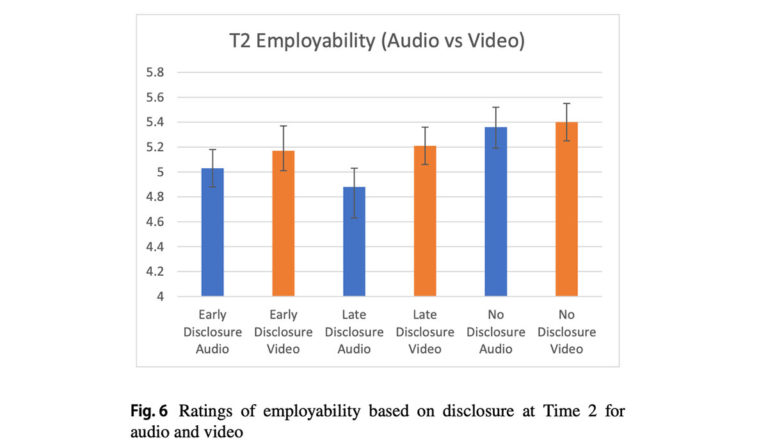Disability Disclosure
A study examined the consequences of disclosing a disability during a job interview.

Read Time: 2 minutes
Published:
If you have a disability, the Americans with Disabilities Act entitles you to ask for and receive any needed accommodations from an employer, without risking your chances of getting or keeping the job you have. But how does this play out as you are looking for a job? When and how do you bring up your disability to get the best hiring result?
Mason Ameri and Terri R. Kurtzberg conducted a study to understand the consequences of disclosure of a disability during job interviews. They recruited 1,917 adults with management experience to view or hear a series of 30-second to 2-minute clips from a simulated job interview and rate how likely they would be to hire the applicant. The applicant was played by a young female adult. She either did not disclose any need for accommodations, or disclosed at the beginning or at the end of the interview. In each of these three disclosure scenarios she also asked for either a small or large pay increase over the proposed salary option.
Early and late disability disclosures were both associated with poorer employability ratings compared to no disclosure during the interview process. Audio disclosure had poorer outcomes than video disclosure. Asking for a significant salary increase also resulted in lower employability ratings.
The graph shows higher employability ratings for not disclosing during interviews at all (the two bars on the far right). It also shows that video communication (orange), that is seeing the applicant, had better outcomes than audio communication only (blue).
The researchers conclude that disclosing a need for accommodation during the interview process may work against job applicants. The choice to disclose is only possible for people with so-called “invisible disabilities” such as chronic pain or learning disabilities, who may never disclose their accommodation needs for fear of repercussions. People of color with disabilities experience additional barriers to accommodation. Video calls worked better when disclosing an invisible disability, because media that include body language and facial expressions may work better for establishing trust. For job seekers with visible disabilities, however, perhaps a phone call interview would allow for more control over the disclosure process.
Employers are obligated by law to accept disability disclosures without negative consequences to the applicant; yet job-hunters with disabilities face discrimination risk.
Databyte via Mason Ameri, Terri R. Kurtzberg. The Disclosure Dilemma: Requesting Accommodations for Chronic Pain in Job Interviews. Journal of Cancer Survivorship, 2022.



